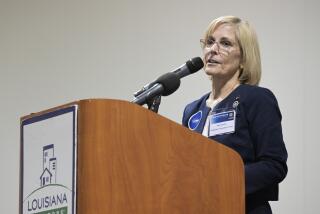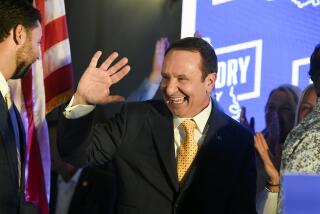Governorship Races Bring Light Turnout
- Share via
Democrat Wallace Wilkinson was elected Tuesday as the next governor of Kentucky, trouncing Republican John Harper in the race to succeed Democratic Gov. Martha Layne Collins.
Light turnouts were reported in both Kentucky and Mississippi, the two states with governorships on the line in an off-year election. Democrats had been favored to win both races.
Also on the ballot were mayors’ races in scores of cities, referendums dealing with gambling proposals in Virginia and Texas and a ballot issue in Maine to decide whether a nuclear power plant should be forced to shut down. With 26.7% of Kentucky’s precincts reporting, Wilkinson, 44, a self-made millionaire, had 67.8% of the vote to 32.2% for Harper. Collins, the first woman elected as governor of Kentucky, was prohibited by law from seeking a second term.
Raucous Philadelphia Race
Light voting was also reported in Philadelphia in the raucous mayors race between incumbent Democrat W. Wilson Goode and his predecessor, Frank L. Rizzo, who switched to the Republican Party in an uphill comeback attempt.
Goode led in the final polls by as much as 10%, but both candidates predicted victory.
During their bitter campaign, Rizzo dubbed Goode “The Mad Bomber” for the 1985 attempt to evict members of the radical group MOVE, which triggered a fire that killed 11 people and left 250 homeless. Goode said the city under Rizzo became a “laughing stock” because of racial polarization and police brutality.
In Mississippi, Jack Reed, a Tupelo clothing manufacturer and retailer, predicted that a grass-roots movement would stun pundits by electing him to the first Republican governorship since Reconstruction. But the polls and history rode with Democrat Ray Mabus, the state auditor.
Points to ‘Proven Record’
“I am really feeling good about my prospects for winning this race, and I think that’s largely due to my proven record of bringing jobs to Mississippi,” Reed said in last-minute campaigning. “I think people are ready to turn to a businessman, rather than a career politician who is making expensive promises.”
In other mayors’ races:
----Indianapolis Mayor William H. Hudnut easily defeated two opponents to win an unprecedented fourth term, less than a week after admitting he had applied for academic jobs in case he lost.
With about one-third of the precincts reporting, the Republican mayor had 69.7% of the vote, far ahead of his closest challenger, Democrat J. Bradford Senden, who had 19.1%. Hudnut enlivened the race last week when he acknowledged he had applied for the presidency of the University of Tennessee at Knoxville and other academic positions he refused to name.
----In Hartford, Conn., Democrat Carrie Saxon-Perry was heavily favored to defeat Republican Philip Steele to become New England’s first black woman mayor.
----Miami’s Xavier Suarez, the nation’s first Cuban-born mayor in the nation, was favored over four challengers, including Maurice Ferre, whose 12-year reign as mayor ended in 1985.
----In Charleston, S.C., Mayor Joseph Riley was strongly favored for a fourth term over Republican Roy DeHaven.
----Voters in Gary, Ind., were expected to elect Thomas Barnes mayor, bringing down the curtain on the administration of Richard Hatcher, one of the nation’s longest-serving black mayors of a major city. Barnes, the Calumet Township Assessor, beat Hatcher in the May Democratic primary and was favored over Republican Thaddeus Romanowski, a retired insurance salesman.
----And in Tucson, Ariz., Republican William Gilkinson, a former police chief, was in a close race with Democrat Thomas Volgy, a 10-year city council member.
Among the major ballot issues being decided around the country were: a proposal to legalize parimutuel betting on horse races throughout Texas and also to legalize dog races in the state’s coastal counties; a proposal to create a state lottery in Virginia; Maine’s third referendum on whether to close the Maine Yankee Nuclear plant, and a bottle-return bill in the District of Columbia.
In New Jersey, meanwhile, the Legislature was up for grabs. Democrats hold the Senate and Republicans have the Assembly majority, but without popular GOP Gov. Thomas H. Kean on the ticket, Democrats hoped to seize control of both houses.
More to Read
Sign up for Essential California
The most important California stories and recommendations in your inbox every morning.
You may occasionally receive promotional content from the Los Angeles Times.













